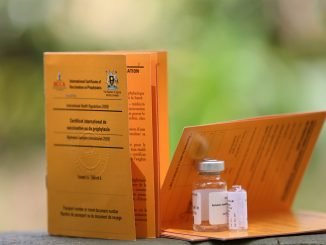
Kampala, Uganda | URN | President Yoweri Museveni and his family are yet to get vaccinated against the coronavirus because they are still undecided on which COVID-19 vaccine to use. Mr Museveni disclosed this on his Sunday 14, March 2021 televised address.
The 75-year-old has come under the spotlight after he previously disputed media reports that he’d been secretly vaccinated long before the vaccines arrived in the country.
The country waited patiently last week to see if the president would publicly get vaccinated with the AstraZeneca COVID-19 vaccine as has been in other countries such as Rwanda, South Africa to spur up public confidence and assurance about the safety of the vaccine amidst fears and myths and misconceptions surrounding the vaccines.
Instead, it was the Health minister Dr Jane Ruth Aceng and the permanent secretary Dr Diana Atwine who volunteered to take the first COVID-19 jabs in the country. Mr Museveni said he and his family are well cushioned and protected from the virus by the system and that his people are still studying which vaccine will be more effective for him.
Mr Museveni also said he has decided to delay his vaccination so as to give health workers who are at high risk the first chance.
“Janet and I did not get vaccinated because we wanted to give priority to health workers who are more at risk,” he said while he is still undecided on which COVID-19 vaccine to use for himself.
The government resolved that the first batch of vaccines would go to people at most risk of contracting the virus including health workers, teachers and security officers.
According to the Health Ministry, over 1,215 people mostly health workers have so far received the COVID-19 jab. The ministry says it selected AstraZeneca because it is cheaper compared to other vaccines and can easily be stored. Each vaccine jab costs $4 and the vaccine needs to be stored between 2 and 8 degrees celsius whereas the other vaccines need negative temperatures which require special storage facilities.
Although Mr Museveni is still undecided on which COVID-19 vaccine to use for himself, he says that the government will procure more of Oxford/AstraZeneca from India. The country had ordered 18 million doses of the vaccine. The use of the AstraZeneca vaccine has however sparked debate elsewhere.
Several countries, including the Democratic Republic of Congo (DRC), Uganda’s neighbour in the West, have suspended the use of the vaccine as a precautionary measure or banned its use after recording adverse reactions among some users.
In some countries, some people are claimed to have developed clots after using the vaccines. Mr Museveni said that a year after COVID-19 broke out in the country; Uganda seems to be doing fairly well as far as battling the virus is concerned.
Available statistics indicate that 40,581 people have been infected by the deadly virus. Of these 12,313 people have recovered while 334 others succumbed to the disease. Only 24 people are still admitted to hospitals with the coronavirus.
Kenya-Uganda relations
President Museveni also addressed the brewing trade wars between Uganda and Kenya, saying Uganda will not retaliate because this never offers a long-lasting solution to the problem.
His remarks come at the backdrop of a heated row between the two East African Community (EAC) countries over’s Kenya’s ban on the importation of Uganda’s maize and poultry products. Kenyan slapped a ban on the importation of Uganda’s maize last week on the grounds, it contains high levels of aflatoxins beyond the permitted limited.
However, Kenya has since lifted the maize ban after setting several safety conditions and measures. The Kenyan government has overtime imposed non-tariff restrictions on other Ugandan commodities suck as milk, eggs, and sugarcane. Recently, the Ugandan parliament expressed displeasure with the fact that Ugandan supermarkets are flooded with Kenyan products yet the Ugandan government remains silent when Kenya bans Ugandan products.
However, Museveni noted that the issue of banned commodities should not take the stage, saying Ugandans and other citizens in the region need to focus on the larger picture of integration. Ugandan produce dealers reportedly lost Shs 5 billion within three days following the ban as the Kenyan authorities returned over 70,000 metric tons of maize, the producers had exported to the neighbouring country.
Museveni said that the current situation can be resolved with patience, focus, and negotiations rather than excitement by a section of politicians who want to be seen talking on television even when they are speaking nothing.
“Dialogue, cooperation, engagement is what we need not just empty shouting on TVs such that they see that you have spoken even when you have spoken nothing,” Museveni said.
Read Also: Partners or Competitors? The road to East African integration
He adds that although integration might not be the solution to the challenge of banned commodities, the problem will never arise if integration succeeds. To back his argument, the president reminded Ugandans, about how much foreign exchange the country is fetching from trade with Kenya compared to the 1980s before they took the first step towards the revival of regional cooperation.
Mr Museveni explained that sometime in 1986, Ugandans wanted the government to close their borders with Kenya but he took a bold decision of not interfering with trade, a decision he says has since benefited Uganda.
Mr Museveni noted that there is a lot that needs to be done to improve the quality of Ugandan products. He says that apart from Kenya, countries like Algeria and Iran wanted to import Ugandan milk and maize but the deal failed due to poor quality products.



